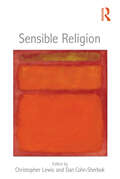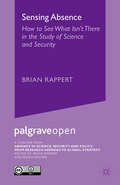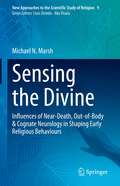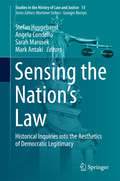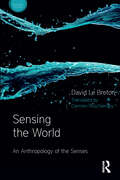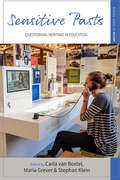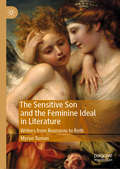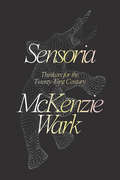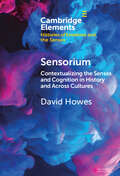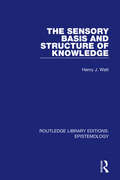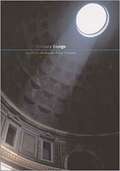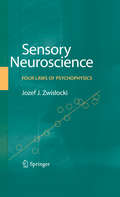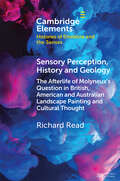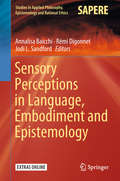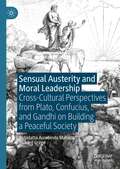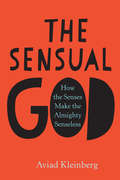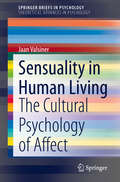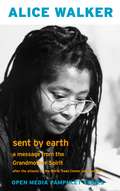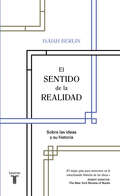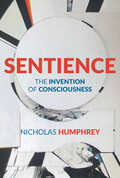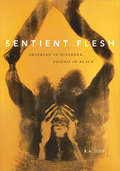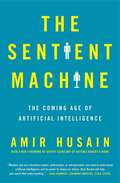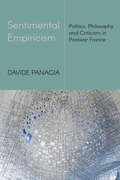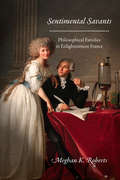- Table View
- List View
Sensible Religion
by Christopher Lewis Dan Cohn-SherbokAround the globe religion is under attack. Humanists, secularists and atheists depict believers as deluded and dangerous. The aim of this book is to challenge this perception. Sensible Religion defends the validity and emphasises the excitement of the religious quest across the faiths. It demonstrates that the practice of sensible religion is often a courageous path pitted against religious extremism and secularism. Written by committed believers from the major world's faiths, the book endorses the term 'sensible' as expressing religious reasonableness as well as sensitivity to criticism and new insights. Followers of the different traditions live ordinary lives in the mainstream of the world. This volume therefore addresses beliefs and the manner in which these convictions relate to social, political and ethical action. Countering the argument that religion is at root extremist and irrational, Sensible Religion brings together thoughtful and critical reflections by leading thinkers about humanity's spiritual quest.
Sensing Absence: Chapter 1 from Absence in Science, Security and Policy
by Brian RappertChapter 1 of this book is open access under a CC BY license.This is a chapter from Absence in Science, Security and Policy edited by Brian Rappert and Brian Balmer. This chapter is available open access under a CC BY license. Part reflection on the forthcoming chapters, part analysis of academic literature, and part programmatic agenda setting, this introduction chapter forwards the importance of questioning taken for granted assumptions in sensing what is absent as a concern. It undertakes this through initially examining what it means to characterize concern as absent or present in the first place. While absence and presence are often treated as binary opposites, it will be argued this distinction is difficult to sustain and unhelp for analysis. On the back of an appreciation of the inter-relation of absence and presence, this chapter then reviews the literature in sociology, ethics, STS and elsewhere relevant to the themes of the volume. A goal is to outline the methodological and epistemological possibilities and problematics of studying what is missing. By way of then proposing what is required, and to set the stage for the other chapters in Part 1, this chapter ends by asking how autostereograms provide a metaphor for viewing that can guide the study of absence.
Sensing the Divine: Influences of Near-Death, Out-of-Body & Cognate Neurology in Shaping Early Religious Behaviours (New Approaches to the Scientific Study of Religion #9)
by Michael N. MarshThis book proposes another unique basis for the origins of religion from disturbances in brain function. It proposes the novel idea that near-death and out-of-body experiences (ND/OBE) engendered “a sense of the divine” in ancient man.As the author points out, key aspects of ND/OBE are thematic of all later established religions. These include journeys to heaven, sightings of brightly-lit godlike figures, and dead people now alive. Thus, ND/OBE could be the originating source of these spiritual motifs. To this, the author adds a fourth factor: various brain influences contribute to or modulate ND/OBE. Such cognate neurological disorders include REM-sleep intrusions, sleep paralysis, narcolepsy, and the Guillain-Barré syndrome. Errors due to aberrant switching between key neural control centers disrupt critical state-boundaries between consciousness and dreaming. This may induce NDE. Thus, in this state, subjects temporarily fail to understand where they are, undergo loss of self, and detached from the world. They imagine a “union with Gods.” Here, then, is the biological basis of ineffability.Ancient humans gained beliefs about the "supernatural" through day-to-day existence. This book argues that near death experiences and cognate neurological conditions, some genetically-determined, could have facilitated, even augmented such beliefs. Hence, in configuring another realm of “spiritual” experience beyond the known environment, these neurological possibilities offer effective traction.
Sensing the Nation's Law: Historical Inquiries Into The Aesthetics Of Democratic Legitimacy (Studies In The History Of Law And Justice #13)
by Mark Antaki Sarah Marusek Angela Condello Stefan HuygebaertThis book examines how the nation – and its (fundamental) law – are ‘sensed’ by way of various aesthetic forms from the age of revolution up until our age of contested democratic legitimacy. Contemporary democratic legitimacy is tied, among other things, to consent, to representation, to the identity of ruler and ruled, and, of course, to legality and the legal forms through which democracy is structured. This book expands the ways in which we can understand and appreciate democratic legitimacy. If (democratic) communities are “imagined” this book suggests that their “rightfulness” must be “sensed” – analogously to the need for justice not only to be done, but to be seen to be done. This book brings together legal, historical and philosophical perspectives on the representation and iconography of the nation in the European, North American and Australian contexts from contributors in law, political science, history, art history and philosophy.
Sensing the World: An Anthropology of the Senses (Sensory Studies)
by David Le BretonSensing the World: An Anthropology of the Senses is a highly original and comprehensive overview of the anthropology and sociology of the body and the senses. Discussing each sense in turn – seeing, hearing, touch, smell, and taste – Le Breton has written a truly monumental work, vast in scope and deeply engaging in style. Among other pioneering moves, he gives equal attention to light and darkness, sound and silence, and his disputation of taste explores aspects of disgust and revulsion. Part phenomenological, part historical, this is above all a cultural account of perception, which returns the body and the senses to the center of social life. Le Breton is the leading authority on the anthropology of the body and the senses in French academia. With a repute comparable to the late Pierre Bourdieu, his 30+ books have been translated into numerous languages. This is the first of his works to be made available in English. This sensuously nuanced translation of La Saveur du monde is accompanied by a spicy preface from series editor David Howes, who introduces Le Breton's work to an English-speaking audience and highlights its implications for the disciplines of anthropology, sociology, and the cross-disciplinary field of sensory studies.
Sensitive Pasts: Questioning Heritage in Education (Making Sense of History #27)
by Carla Van Boxtel Maria Grever Stephan KleinHeritage, as an area of research and learning, often deals with difficult historical questions, due to the strong emotions and political commitments that are often at stake. In this, it poses particular challenges for teachers, museum educators and the publics they serve. Guided by a shared focus on these “sensitive pasts,” the contributors to this volume draw on new theoretical and empirical research to provide valuable insights into heritage pedagogy. Together they demonstrate the potential of heritage as a historical-educational domain that transcends myopic patriotism, parochialism and simplistic relativism, helping to enhance critical and sophisticated historical thinking.
The Sensitive Son and the Feminine Ideal in Literature: Writers from Rousseau to Roth
by Myron TumanThis book considers major male writers from the last three centuries whose relation to a strong, often distant woman—one sometimes modeled on their own mother—forms the romantic core of their greatest narratives. Myron Tuman explores the theory that there is an underlying psychological type, the sensitive son, connecting these otherwise diverse writers. The volume starts and ends with Jean-Jacques Rousseau, whose Confessions provides an early portrait of one such son. There are chapters on other adoring sons, Stendhal, Sacher-Masoch, Scott Fitzgerald, and Turgenev, as well as on sons like Bernard Shaw and D.H. Lawrence with a different, less affectionate psychological disposition toward women. This book demonstrates how, despite many differences, the best works of all these sensitive sons reflect the deep, contorted nature of their desire, a longing that often seems less for an actual woman than for an elusive feminine ideal.
The Sensitivity Principle in Epistemology
by Kelly Becker Tim BlackThe sensitivity principle is a compelling idea in epistemology and is typically characterized as a necessary condition for knowledge. This collection of thirteen new essays constitutes a state-of-the-art discussion of this important principle. Some of the essays build on and strengthen sensitivity-based accounts of knowledge and offer novel defences of those accounts. Others present original objections to sensitivity-based accounts (objections that must be taken seriously even by those who defend enhanced versions of sensitivity) and offer comprehensive analysis and discussion of sensitivity's virtues and problems. The resulting collection will stimulate new debate about the sensitivity principle and will be of great interest and value to scholars and advanced students of epistemology.
Sensoria: Thinkers for the Twentieth-First Century
by McKenzie WarkDesign, Politics, the Environment: a survey of the key thinkers and ideas that are rebuilding the world in the shadow of the anthropoceneAs we face the compounded crises of late capitalism, environmental catastrophe and technological transformation, who are the thinkers and the ideas who will allow us to understand the world we live in? McKenzie Wark surveys three areas at the cutting edge of current critical thinking: design, environment, technology and introduces us to the thinking of nineteen major writers. Each chapter is a concise account of an individual thinker, providing useful context and connections to the work of the others.The authors include: Sianne Ngai, Kodwo Eshun, Lisa Nakamura, Hito Steyerl, Yves Citton, Randy Martin, Jackie Wang, Anna Lowenhaupt Tsing, Achille Mbembe, Deborah Danowich and Eduardo Viveiros de Castro, Eyal Weizman, Cory Doctorow, Benjamin Bratton, Tiziana Terranova, Keller Easterling, Jussi Parikka.Wark argues that we are too often told that expertise is obtained by specialisation. Sensoria connects the themes and arguments across intellectual silos. They explore the edges of disciplines to show how we might know the world: through the study of culture, the different notions of how we create such things, and the impact that the machines that we devise have had upon us. The book is a vital and timely introduction to the future both as a warning but also as a road map on how we might find our way out of the current crisis.
Sensorium: Contextualizing the Senses and Cognition in History and Across Cultures (Elements in Histories of Emotions and the Senses)
by David HowesDo the senses have a history? How many might there be? Are the senses so many independent channels, or do they interact with and modulate each other? If so, how might we cultivate the capacity to see feelingly or hear colours? What makes smell 'the affective sense'? These are among the questions to be addressed in this Element. It pries the senses and perception loose from the psychology laboratory to focus on how they have been constructed and lived differently in different historical periods and across cultures. Many of its findings are surprising because they run counter to our common-sense assumptions about the sensorium. They make uncommon sense. Plus the reader will meet some fascinating historical characters like the prolific 17th century natural philosopher Margaret Cavendish (also author of the play The Convent of Pleasure) and the late 19th century artist James McNeill Whistler, who infused his paintings with music.
The Sensory Basis and Structure of Knowledge (Routledge Library Editions: Epistemology)
by Henry J. WattOriginally published in 1925. If we are to know what intelligence is, how the brain can think, and what place mind holds in the scheme of things, we must first have a science of the sensory basis and structure of knowledge. This book supplies that need; it also serves as a short introduction to the systematic psychology of cognition.
Sensory Design
by Frank VodvarkaWhat if we designed for all of our senses? Suppose for a moment that sound, touch, and odor were treated as the equals of sight, and emotion considered as important as cognition. What would our built environment be like if sensory response, sentiment, and memory were critical design factors, the equals of structure and program? <p><p> In Sensory Design, Joy Monice Malnar and Frank Vodvarka explore the nature of our responses to spatial constructs—from various sorts of buildings to gardens and outdoor spaces, to constructions of fantasy. To the degree that this response can be calculated, it can serve as a typology for the design of significant spaces, one that would sharply contrast with the Cartesian model that dominates architecture today. <p><p> In developing this typology, the authors consult the environmental sciences, anthropology, psychology, and architectural theory, as well as the spatial analysis found in literary depiction. Finally, they examine the opportunities that CAVE™ and other immersive virtual reality technologies present in furthering a new, sensory-oriented design paradigm. The result is a new philosophy of design that both celebrates our sensuous occupation of the built environment and creates more humane design. <p><p> Joy Monice Malnar, AIA, is associate professor of architecture at the University of Illinois, Urbana-Champaign. Frank Vodvarka is associate professor of fine arts at Loyola University Chicago. They are coauthors of The Interior Dimension: A Theoretical Approach to Enclosed Space (1992).
Sensory Neuroscience: Four Laws of Psychophysics
by Jozef J. ZwislockiSensory Neuroscience: Four Laws of Psychophysics organizes part of psychophysics -- a science of quantitative relationships between human sensations and the stimuli that evoke them. Although psychophysics belongs to sensory neuroscience, and is coupled to neurophysiology, it has also branched out to various specialized disciplines, including the disciplines of vision and hearing, ophthalmology, optometry, otology, and audiology. Due to this diversification and fragmentation, psychophysics has had an ad-hoc, phenomenological orientation. Besides Weber's law of differential sensitivity, and the still-controversial Stevens' power law, it has lacked a systematic grid of scientific laws. Sensory Neuroscience: Four Laws of Psychophysics provides valid unifying principles and systematic applications for this otherwise fragmented precursor of experimental psychology, and defines four multisensory relationships of substantial generality between sensations and the underlying stimulus variables. This book will be particularly useful to auditory researchers, experimental psychologists, and behavioral neuroscientists.
Sensory Perception, History and Geology: The Afterlife of Molyneux's Question in British, American and Australian Landscape Painting and Cultural Thought (Elements in Histories of Emotions and the Senses)
by Richard ReadWiiliam Molyneux's question to John Locke about whether a blind man restored to sight could name the difference between a cube and a sphere without touching them shaped fundamental conflicts in philosophy, theology and science between empirical and idealist answers that are radically alien to current ways of seeing and feeling, but were born of colonizing ambitions whose devastating genocidal and ecocidal consequences intensify today. This Element demonstrates how landscape paintings of unfamiliar terrains required historical and geological subject matter to supply tactile associations for empirical recognition of space, whereas idealism conferred unmediated but no less coercive sensory access. Close visual and verbal analysis using photographs of pictorial sites trace vividly different responses to the Question from William Hazlitt and John Ruskin in Britain to nineteenth-century authors and artists in the United States and Australia, including Ralph Waldo Emerson, Thomas Cole, William Haseltine, Fitz Henry Lane and Eugene von Guérard.
Sensory Perceptions in Language, Embodiment and Epistemology (Studies in Applied Philosophy, Epistemology and Rational Ethics #42)
by Annalisa Baicchi Rémi Digonnet Jodi L. SandfordThe book illustrates how the human ability to adapt to the environment and interact with it can explain our linguistic representation of the world as constrained by our bodies and sensory perception. The different chapters discuss philosophical, scientific, and linguistic perspectives on embodiment and body perception, highlighting the core mechanisms humans employ to acquire knowledge of reality. These processes are based on sensory experience and interaction through communication.
Sensual Austerity and Moral Leadership: Cross-Cultural Perspectives from Plato, Confucius, and Gandhi on Building a Peaceful Society
by Debidatta Aurobinda Mahapatra Richard GregoThis book examines the link between sensual austerity and moral leadership—a topic largely neglected in contemporary academic scholarship and public policy—by exploring the comparative cross-cultural perspectives of Plato, Confucius, and Gandhi, on this theme. Despite the diverse cultural contexts that gave rise to their respective philosophical perspectives, they shared similar views on what might constitute a universal and perennial basis for individual moral development in any harmonious political order. They all agreed that sensual austerity is necessary for the realization of a flourishing society and political culture: recognizing that control over sensual desire is both a vehicle for individual moral self-cultivation and social-political progress. Sensual austerity is thus an essential aspect of any morally governed person, institution, state, or society. The book also argues that further examination of this theme may assist scholars and policymakers in developing more peaceful and harmonious national and global communities.
The Sensual God: How the Senses Make the Almighty Senseless
by Aviad KleinbergIn the Old Testament, God wrestles with a man (and loses). In the Talmud, God wriggles his toes to make thunder and takes human form to shave the king of Assyria. In the New Testament, God is made flesh and dwells among humans. For religious thinkers trained in Greek philosophy and its deep distaste for matter, sacred scripture can be distressing. A philosophically respectable God should be untainted by sensuality, yet the God of sacred texts is often embarrassingly sensual.Setting experts' minds at ease was neither easy nor simple, and often faith and logic were stretched to their limits. Focusing on examples from both Christian and Jewish sources, from the Bible to sources from the Late Middle Ages, Aviad Kleinberg examines the way Christian and Jewish philosophers, exegetes, and theologians attempted to reconcile God's supposed ineffability with numerous biblical and postbiblical accounts of seeing, hearing, smelling, touching, and even tasting the almighty. The conceptual entanglements ensnaring religious thinkers, and the strange, ingenious solutions they used to extricate themselves, tell us something profound about human needs and divine attributes, about faith, hope, and cognitive dissonance.
Sensuality in Human Living: The Cultural Psychology of Affect (SpringerBriefs in Psychology)
by Jaan ValsinerThis book is a theoretical account for general psychology of how human beings meaningfully relate with their bodies-- from the basic physiological processes upwards to the highest psychological functions of religiosity, ethical reasoning, and devotional practices. It unites art and science into a new theory of affective synthesis that human minds are constantly involved in their everyday life worlds. Provides a new theory of aesthetic synthesis;Demonstrates the links between art and science;Provides a new understanding of the role of affect in human cognition.
Sent by Earth: A Message from the Grandmother Spirit
by Alice WalkerNow more timely than ever, Alice Walker's Sent By Earth reflects on the tragedy of September 11, 2001, and addresses the anger many Americans felt at the presumed perpetrator of the attack: Osama bin Laden. In powerfully reflective, nuanced, and above all heartfelt prose, Walker explores the seeds of hatred and resentment around the globe, and advances a surprisingly controversial theory: that hatred can never be defeated by hatred, but only by love.
El sentido de la realidad: Sobre las ideas y su historia
by Isaiah BerlinTaurus recupera El sentido de la realidad, el libro más personal de uno de los principales pensadores liberales del siglo XX. ¿Cómo construir una sociedad decente?¿Por qué ciertas ideas aparentemente nobles y hermosaspueden alimentar las peores ideologías? Referente ineludible en la historia de las ideas, Berlin recorre magistralmente, en estos nueve ensayos, las ideas que han gobernado la historia europea durante los últimos tres siglos: nacionalismo, liberalismo y especialmente marxismo. Con el fin de extraer lecciones morales, Berlin se pregunta por qué los seres humanos tienden a admirar a hombres movidos por la ambición, los celos o la vanidad monomaníaca -incluidas figuras notables de la historia como Pedro el Grande y Napoleón-, y proporciona algunas respuestas, siempre reveladoras, en este estudio de las ideas. El sentido de la realidad incluye textos clave de quien ha sido considerado uno de los mejores ensayistas en inglés, y cubre un amplio abanico de temas: el realismo en la historia, naturaleza y el impacto del marxismo, la historia del socialismo, la radical revolución cultural llevada a cabo por los románticos, las nociones rusas de compromiso artístico, o la práctica y el origen del nacionalismo... Reseñas:«Este libro es indispensable para cualquiera que quiera comprender la historia de las ideas.»John Gray, The New York Times Book Review «El viejo zorro del liberalismo ofrece esta obra perspicaz. Es tan brillante a la hora de repensar el pasado como a la de transmitir su pensamiento.»Kirkus Reviews «Erudito pero no académico, se dirige al lector general, y habla con una energía tan contagiosa que nos arrastra a un territorio que nos parecía inaccesible, y se convierte en el mejor guía para movernos en la emocionante historia de las ideas.»Robert Darnton, The New York Review of Books «Si es posible elevar más una reputación ya tan notable, estos ensayos podrían lograrlo. Son textos de urbanidad, perspicacia, profunda erudición y gran elegancia literaria.»A.C. Grayling, Financial Times
Sentience: The Invention of Consciousness
by Nicholas HumphreyThe story of a quest to uncover the evolutionary history of consciousness from one of the world's leading theoretical psychologists.We feel, therefore we are. Conscious sensations ground our sense of self. They are crucial to our idea of ourselves as psychic beings: present, existent, and mattering. But is it only humans who feel this way? Do other animals? Will future machines? Weaving together intellectual adventure and cutting-edge science, Nicholas Humphrey describes in Sentience his quest for answers: from his discovery of blindsight in monkeys and his pioneering work on social intelligence to breakthroughs in the philosophy of mind.The goal is to solve the hard problem: to explain the wondrous, eerie fact of &“phenomenal consciousness&”—the redness of a poppy, the sweetness of honey, the pain of a bee sting. What does this magical dimension of experience amount to? What is it for? And why has it evolved? Humphrey presents here his new solution. He proposes that phenomenal consciousness, far from being primitive, is a relatively late and sophisticated evolutionary development. The implications for the existence of sentience in nonhuman animals are startling and provocative.
Sentient Flesh: Thinking in Disorder, Poiesis in Black (Black Outdoors: Innovations in the Poetics of Study)
by R. A. JudyIn Sentient Flesh R. A. Judy takes up freedman Tom Windham’s 1937 remark “we should have our liberty 'cause . . . us is human flesh" as a point of departure for an extended meditation on questions of the human, epistemology, and the historical ways in which the black being is understood. Drawing on numerous fields, from literary theory and musicology, to political theory and phenomenology, as well as Greek and Arabic philosophy, Judy engages literary texts and performative practices such as music and dance that express knowledge and conceptions of humanity appositional to those grounding modern racialized capitalism. Operating as critiques of Western humanism, these practices and modes of being-in-the-world—which he theorizes as “thinking in disorder,” or “poiēsis in black”—foreground the irreducible concomitance of flesh, thinking, and personhood. As Judy demonstrates, recognizing this concomitance is central to finding a way past the destructive force of ontology that still holds us in thrall. Erudite and capacious, Sentient Flesh offers a major intervention in the black study of life.
The Sentient Machine: The Coming Age of Artificial Intelligence
by Amir Husain&“A must-read for anyone looking to understand how artificial intelligence is poised to transform human society and life.&” —Paul Scharre, Author of Four Battlegrounds: Power in the Age of Artificial Intelligence The future is now. Acclaimed technologist and inventor Amir Husain explains how we can live amidst the coming age of sentient machines and artificial intelligence—and not only survive, but thrive.Artificial &“machine&” intelligence is playing an ever-greater role in our society. We are already using cruise control in our cars, automatic checkout at the drugstore, and are unable to live without our smartphones. The discussion around AI is polarized; people think either machines will solve all problems for everyone, or they will lead us down a dark, dystopian path into total human irrelevance. Regardless of what you believe, the idea that we might bring forth intelligent creation can be intrinsically frightening. But what if our greatest role as humans so far is that of creators? Amir Husain, a brilliant inventor and computer scientist, argues that we are on the cusp of writing our next, and greatest, creation myth. It is the dawn of a new form of intellectual diversity, one that we need to embrace in order to advance the state of the art in many critical fields, including security, resource management, finance, and energy. &“In The Sentient Machine, Husain prepares us for a brighter future; not with hyperbole about right and wrong, but with serious arguments about risk and potential&” (Dr. Greg Hyslop, Chief Technology Officer, The Boeing Company). He addresses broad existential questions surrounding the coming of AI: Why are we valuable? What can we create in this world? How are we intelligent? What constitutes progress for us? And how might we fail to progress? Husain boils down complex computer science and AI concepts into clear, plainspoken language and draws from a wide variety of cultural and historical references to illustrate his points. Ultimately, Husain challenges many of our societal norms and upends assumptions we hold about &“the good life.&”
Sentimental Empiricism: Politics, Philosophy, and Criticism in Postwar France
by Davide PanagiaSentimental Empiricism reconsiders the legacy of eighteenth and nineteenth century empiricism and moral sentimentalism for the intellectual formation of the generation of postwar French thinkers whose work came to dominate Anglophone conversations across the humanities under the guise of “French theory.” Panagia’s book first shows what was missed in the reception of this literature in the Anglophone academy by attending to how France’s pedagogical milieu plays out church and state relations in the form of educational debates around reading practices, the aesthetics of mimesis, French imperialism, and republican universalism. Panagia then shows how such thinkers as Jean Wahl, Simone de Beauvoir, Gilbert Simondon, Gilles Deleuze, and Michel Foucault develop a sentimental empiricist critical philosophy that distances itself from dialectical critique and challenges the metaphysical premise of inherent relations, especially as it had been articulated in the tradition of Aristotelian scholasticism.Panagia develops the long disputed political legacy of French theory through an exploration of how these thinkers came to understand an aesthetic of mimesis as a credentialing standard for selection to political participation. Since, in France, the ability to imitate well is a state qualification necessary to access offices of elite power, the political, aesthetic, and philosophical critique of mimesis became one of the defining features of sentimental empiricist thought. By exploring the historical, intellectual, cultural, and philosophical complexities of this political aesthetic, Panagia shows how and why postwar French thinkers turned to a tradition of sentimental empiricism in order to develop a new form of criticism attentive to the dispositional powers of domination. This book is available from the publisher on an open access basis.
Sentimental Savants: Philosophical Families in Enlightenment France
by Meghan K. RobertsThough the public may retain a hoary image of the lone scientific or philosophical genius generating insights in isolation, scholars discarded it long ago. In reality, the families of scientists and philosophers in the Enlightenment played a substantial role, not only making space for inquiry within the home but also assisting in observing, translating, calculating, and illustrating. Sentimental Savants is the first book to explore the place of the family among the savants of the French Enlightenment, a group that openly embraced their families and domestic lives, even going so far as to test out their ideas--from education to inoculation--on their own children. Meghan K. Roberts delves into the lives and work of such major figures as Denis Diderot, Émilie Du Châtelet, the Marquis de Condorcet, Antoine Lavoisier, and Jérôme Lalande to paint a striking portrait of how sentiment and reason interacted in the eighteenth century to produce not only new kinds of knowledge but new kinds of families as well.
